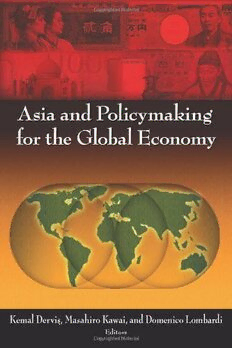
Asia and Policymaking for the Global Economy PDF
213 Pages·2011·1.087 MB·English
Most books are stored in the elastic cloud where traffic is expensive. For this reason, we have a limit on daily download.
Preview Asia and Policymaking for the Global Economy
Description:
In this collaboration between the Brookings Institution and the Asian Development Bank Institute, eminent international economists examine the increased influence of Asian nations in the governance of global economic affairs, from the changing role of the G-20 to the reform of multilateral organizations such as the International Monetary Fund. Established in the aftermath of the Asian financial crisis at the ministerial level, the G-20 has served as a high-level platform for discussing economic analyses and policy responses since 1999. During the current global financial crisis, however, the G-20's role moved toward that of a global crisis management committee at the leadership level. The challenge now for the G-20 is to succeed in fostering ongoing and increasing cooperation among its members while being supportive of, rather than trying to replace, more universal institutions. After analyzing the dynamics of growth in Asia comparatively and historically, the volume appraises the scope for policy coordination among key economies. The contributors analyze financial stability in emerging Asia and then assess the implications of Asia's increasing role within the newly emerging system of global economic governance, focusing especially on reform of the international monetary structure. Contributors: Dony Alex (ICRIER, New Delhi), Kemal Dervis (Brookings), Hasan Ersel (Sabanci University), Karim Foda (Brookings), Yiping Huang (Peking University), Masahiro Kawai (ADBI), Rajiv Kumar (FICCI, New Delhi), Domenico Lombardi (Oxford University and Brookings), Jos?© Antonio Ocampo (Columbia University), Jim O Neill (Goldman Sachs)
See more
The list of books you might like
Most books are stored in the elastic cloud where traffic is expensive. For this reason, we have a limit on daily download.
